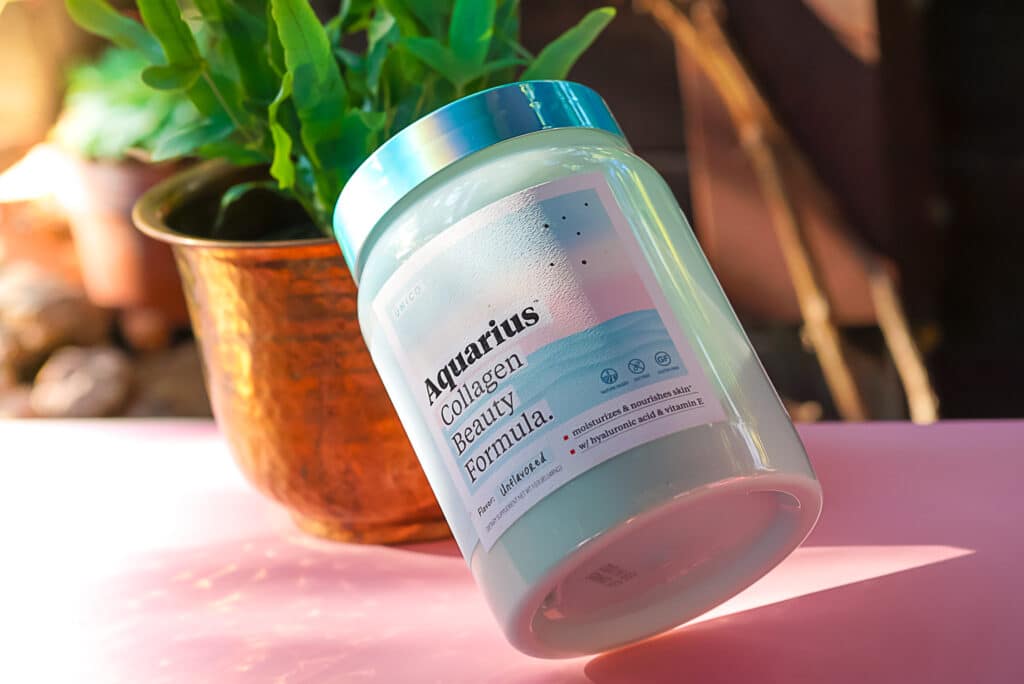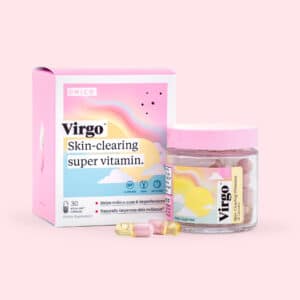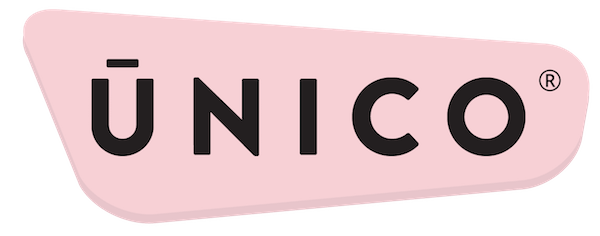Collagen and the vegan diet are two of the most popular topics in health & lifestyle conversations these days, but can they actually co-exist? Is collagen vegan or not? Must vegans look elsewhere for a skincare boost? Let’s drill down and find out.

Without a doubt, collagen is the hot topic of the year in ingestible beauty supplementation. And for good reason. Collagen is the main protein found in human and animal connective tissues, and is responsible for maintaining the firm structure of our bodies.
Collagen gives resilience to our bones, ligaments, joints, and blood vessels. Perhaps most notably, it also gives skin its strength, elasticity, and youthful tone.
As we age, our ability to naturally make collagen diminishes, which can lead to injury and slower healing of our connective tissue when damaged.
The reduced production of collagen is also the cause of wrinkles and sagging skin. However, research shows that supplementing with collagen may improve the hydration, elasticity, and density of skin.1
Is Collagen Vegan?
I’ll just come out and say it- collagen proteins do not exist in plant foods, and it is not vegan.

Collagen supplements are created by extracting the collagen proteins from animal bones, connective tissue, and hides of either cows (‘bovine collagen’) or pigs (‘porcine collagen’).
There are some varieties of fish-based ‘marine collagen’ as well.
Collagen is only found naturally in animals. It is not vegan.
Okay so…since collagen is only found in animals, are there any vegan collagen sources?
The answer is…almost.
The Future of Collagen…
…Might actually include vegan collagen!
Researchers have very recently discovered how to synthesize collagen from genetically engineered yeasts and bacteria!2
The bacteria is given human or animal genes, which then helps it to secrete fragments of collagen that are biologically identical to human collagen. Pretty cool stuff.
These forms of collagen will be vegan, but certainly not free of GMOs.
These forms of collagen will be vegan, but certainly not free of GMOs.
Protein enzymes are then added, and collagen molecules are created.
According to researchers, this will be a sustainable and affordable way to make collagen supplements in coming years.
While this is promising news, these products are not commercially available on the market.
“But Wait” you say – “I See Ads for ‘Vegan Collagen’ on my Instagram daily!”
Correct. You say many companies promoting ‘vegan collagen’.
However.
This supplements are not actually vegan collagen products, but rather “vegan collagen boosters”.
Vegan collagen ‘boosters’ are simply a combination of skin-boosting vitamins and amino acids meant to stimulate your body’s own collagen production.
These products ARE vegan, but they are NOT contain real collagen.
This can be confusing and frustrating for people who want to follow a vegan diet but also want to keep their skin looking youthful.
Thankfully there are a lot of other ways for people to build their own collagen and promote healthy skin through a well-planned vegan diet.
Plant Based Collagen Building Blocks
Collagen is made from amino acids, which are molecules that behave like building blocks. Without these building blocks, the body can’t create proteins.
Collagen is somewhat unique because it’s especially high in the amino acids glycine and proline.3
These amino acids are considered “non-essential” which means that our bodies can create the amino acids without getting them in the diet. However, it may be beneficial to assist the body by consuming more of these.
Vegan protein sources that are high in glycine and proline include:
- Black beans
- Kidney beans
- Soybeans
- Sunflower seeds
- Chia seeds
- Pumpkin seeds
- Pistachios
- Cabbage
- Asparagus
- Mushrooms
- Seaweed
Recipe Idea: Consider a crispy seaweed packet instead of traditional potato chips when you reach for a snack. Sprinkle sunflower seeds on a salad for a healthy crunch.
Get Enough High-Quality Protein
Getting enough high-quality protein, or protein sources with all the essential amino acids, is also important for collagen production.
Vegan sources of protein can easily be made complete by pairing them with whole-grain sources.
Great choices for these high quality pairings include hummus and crackers, beans and rice, oatmeal with walnuts, or nut butter on bread. Quinoa is considered a complete vegan protein all by itself.
Recipe Idea: Consider a lentil, kale, and quinoa salad with vinaigrette dressing for a light evening meal.
Nutrients that Support Collagen Production and Skin Health
The formation of collagen is a complicated process, but there are certain nutrients that are especially important. These nutrients include vitamin C, zinc, and copper, each of which can be easily obtained in the vegan diet.
In addition to collagen production, several other nutrients are important to skin health because of their antioxidant, anti-inflammatory, and sun protecting effects.
Vitamin C – You Can’t Make Collagen Without It
Vitamin C might just be the most important nutrient when it comes to collagen formation.
In fact, a lack of vitamin C in the diet can lead to a disease called scurvy, in which body structures quite literally fall apart – yikes!4
First, little links of collagen called fibrils are made by special cells called fibroblasts near the place where new collagen is needed.
Then vitamin C acts like tiny scissors that snip the ends of those fibrils, so they stick together properly. Without vitamin C, blood vessels start leaking, teeth begin to fall out, joints become painful as they weaken, and skin begins to bruise and break down.
Vitamin C is also needed for pollution and sun protection.5 The nutrient is a very powerful antioxidant, which means it protects the skin from free radicals, or particles that would otherwise harm healthy cells.
Some of these damaging particles are waste products we naturally make when we turn our food into energy. Others get into our skin as a result of pollutants like smoke and sun exposure.
The highest sources of vitamin C include:
- Strawberries
- Bell peppers
- Papayas
- Oranges
- Pineapple
- Kiwifruit
- Broccoli
- Kale
- Brussels sprouts
Recipe Idea: Consider a tropical-flavored vitamin C boost at lunch with an orange, pineapple, and kiwi salad.
Zinc
Without enough zinc, the body’s ability to build collagen declines.6
That’s because zinc is necessary to produce the enzymes which aid in collagen production.
Zinc also helps:
- Protect Existing Collagen
- Assists in DNA repair
- Aid in Wound Healing
As you can tell – these roles make zinc an all-star nutrient for skin health!
Vegan sources of zinc include pumpkin seeds, lentils, garbanzo beans, and cashews.
Recipe Idea: Consider adding pumpkin seeds to your daily oatmeal. Or garbanzo beans as a protein source to soups or salad.
Copper: An Important Skin Mineral
Another mineral that skin can’t thrive without is copper.7
Copper reinforces the structure of new collagen and is needed to create enzymes used in the protein formation.
Foods that are high in copper include:
- Shiitake mushrooms
- Cashews
- Sesame seeds
- Garbanzo beans
- Walnuts
- Lentils
Recipe Idea: Consider adding mushrooms and cashews to a stir-fry. Try sprinkling walnuts on your morning oatmeal.
Antioxidants: Vitamin E and Resveratrol
Antioxidants are very important to the health of skin and deserve a little more explanation.
Perhaps you remember the term ‘free radicals’ from your old high school biology class.
Free radicals are chemical particles that are desperately looking for other particles to react with, no matter what damage they may cause.
They are a bit like unsupervised toddlers in a toy shop…running around, grabbing, and destroying whatever they are immediately attracted to.
Antioxidants are like the Moms who finally catch up with their children.
They scoop up their children, and drag them out of the store until they can behave themselves.
Like vitamin C, vitamin E and the phytonutrient resveratrol both act as antioxidants.8,9
They help protect the skin from free radicals produced by UV rays and environmental pollutants.
In addition to their antioxidant effects, these nutrients are also anti-inflammatory – which helps reduce skin redness.
Vegan sources of vitamin E include spinach, wheat germ, almonds, and sunflower seeds.
Sources of resveratrol include red grapes, blueberries, cranberries, red wine, and red grape juice.
Fun Fact: Red Grapes, specifically Vitis vinifera L. or French Wine Grapes, are especially high in resveratrol and other highly bioavailable polyphenols. That’s why we use a specialty Grape extract in our popular skin-clearing vitamin!
Recipe Idea: Consider eating a spinach salad with blueberries, almond slivers, and red wine vinaigrette.
Omega-3 Fatty Acids
Omega-3, also known as the ‘essential’ fatty acid, isn’t just important for heart and brain health.
Some studies show that dietary omega-3’s can also help protect the skin from harmful ultraviolet rays.10
Evidence suggests that regularly eating omega-3-rich foods might even be better than using sunscreen alone.
Healthy fats also improve the look of skin by helping it retain moisture, and by reducing inflammation.11
Vegan foods high in omega-3 fatty acids include walnuts, and flaxseed. Some supplements also contain vegan, algal-based Omega-3 (like our AURA Botanical Mood Booster.)
Recipe Idea: Consider adding ground flaxseed meal to any dish including soups, beans, and casseroles. Flaxseed meal is nearly tasteless and is a simple way to add healthy fat to any meal.
Beta-Carotene
Beta-carotene is a form of vitamin A that is found in many foods.
This nutrient is best-known for helping support eye health, but it’s also fantastic for your skin.
It helps stimulate new skin cell growth, and may help stimulate collagen production.
Many topical skin products include vitamin A in the form of retinol to help treat acne and wrinkles.
Some research suggests that beta-carotene helps protect against UV rays.12
Vegan sources of beta-carotene include carrots, tomatoes, sweet potatoes, apricots, and leafy green vegetables (which are some of the healthiest veggies on earth!)
Recipe idea: Enjoy a tomato-based vegetable soup made with carrots and sweet potatoes.
Takeaway: A Plant-Based Diet is Naturally Great for Your Skin!
You may have noticed that many of the foods listed above are commonly consumed in the vegan lifestyle.
Research shows that eating a plant-based diet can be inherently great for skin health on its own because it often includes foods that are rich in nutrients that support collagen production.13
Those plant-based foods support skin health with their bounty of antioxidant and anti-inflammatory properties.
So even though collagen might not be compatible with a strict plant-based diet, a healthy vegan diet can still be great for your skin.
Sources:
1https://www.ncbi.nlm.nih.gov/pmc/articles/PMC6835901/
2https://link.springer.com/article/10.1007/s00253-005-0180-x
3https://www.ncbi.nlm.nih.gov/pmc/articles/PMC6153947/
4https://www.ncbi.nlm.nih.gov/pmc/articles/PMC2567249/
5https://pubmed.ncbi.nlm.nih.gov/17008880/
6https://www.ncbi.nlm.nih.gov/pmc/articles/PMC2981717/
7https://pubmed.ncbi.nlm.nih.gov/6110524/
8https://www.ncbi.nlm.nih.gov/pmc/articles/PMC4976416/
9https://www.ncbi.nlm.nih.gov/pmc/articles/PMC3249911/
10https://onlinelibrary.wiley.com/doi/10.1111/j.1600-0625.2011.01294.x
11https://lpi.oregonstate.edu/mic/health-disease/skin-health/essential-fatty-acids
12https://academic.oup.com/ajcn/article/96/5/1179S/4577133
13https://www.ncbi.nlm.nih.gov/pmc/articles/PMC7380694/
14https://www.ncbi.nlm.nih.gov/books/NBK209844/
Recommended Reading:
- Is Collagen Vegan? How to Support your Skin While Eating Vegan. - September 23, 2021

